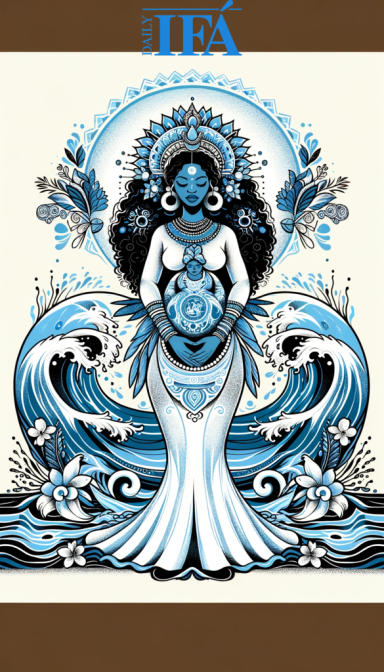
About ORISHÀ YEMANJÁ
Yemanjá, also known as Yemoja, Iemanjá, or Yemaya, is a significant orisha in the Yoruba religion and its diasporic forms such as Candomblé and Santería. She embodies the vastness, power, and nurturing qualities of the ocean, making her a central figure in these traditions.
Yemanjá's influence in a person's life extends from spiritual to emotional realms. As a deity of the ocean, motherhood, and protection, she offers guidance, nurturing, and a sense of security. Her role as a divine mother is reflected in her care and support for her followers, embodying virtues of compassion, healing, and love. Yemanjá's presence in a person's life underscores the importance of emotional well-being, adaptability in the face of life's challenges, and the nurturing of relationships and family bonds. Her association with divination and wisdom also provides spiritual guidance, helping individuals make informed decisions and find their paths in life.
About the ORISHÁ
Roles and
Influence
- Goddess of the Ocean: As the primary goddess of the ocean, Yemanjá represents the nurturing and sustaining qualities of water. She is revered for her connection to all bodies of water, symbolizing life and sustenance.
- Mother of All Orishas: Yemanjá is the mother and protector of all orishas, representing maternal care and support essential for life. Her role as a mother figure extends to her followers, whom she nurtures and protects.
- Goddess of Motherhood and Fertility: Yemanjá plays a crucial role in matters of motherhood, fertility, and childbirth. Women often invoke her for assistance in conception, safe childbirth, and the well-being of their children.
- Protector of Children: Her protective nature is especially evident in her role as a guardian of children. Yemanjá is called upon to ensure the safety and well-being of the young, offering guidance and love.
- Goddess of Love and Relationships: Yemanjá influences love, romance, and harmonious relationships. She is sought for blessings in marriage and family life, guiding individuals in matters of the heart.
- Healer and Protector against Illness: Known for her healing abilities, Yemanjá aids in curing physical and emotional ailments, offering protection against sickness and promoting well-being.
- Goddess of Divination: Her wisdom and guidance are essential in divinatory practices, providing insights and spiritual advice.
- Patron of Fishermen and Seafarers: Fishermen and seafarers look up to Yemanjá for her blessings for a bountiful catch, protection at sea, and safe travels.
- Symbol of Compassion and Empathy: Yemanjá's compassionate nature provides solace and support, offering comfort and healing to those in need.
- Goddess of Transformation and Adaptation: She teaches adaptability and resilience, helping individuals navigate life's changes and challenges.
Characteristics and Symbolism
- Symbols: Silvered Abebé (fan with mirror), waning moon, waves, fish, and fans made of white metal.
- Colors: Crystal colors, sometimes white, light blue, light green, and pale pink.
- Natural Places: Sea, solitary beaches, unwooded hills, fields, mountains.
- Flowers and Essences: White lilies, thornless roses, aloe, musk, lily, benzoin, field flowers, orange blossoms, jasmine, white rose, orchid, chrysanthemum.
- Stones, Metal, Health: Diamonds, rock crystal, white pearls, aquamarine, silver (sometimes platinum, white gold), psyche, nervous system.
- Planet, Weekday, Element: Moon, Saturday, sea water and freshwater flowing into the sea.
- Drinks, Foods, Offerings: Mineral water, sweet white or red wine, white pudding, acaçá, saltwater fish, rice balls, various types of dumplings, watermelon, white cocada (coconut sweet), papaya.
- Commemoration Day: February 2nd.
Key Manifestations (Aspects)
Yemanjá manifests in several forms, including
- Akurá (Acurá) - A joyful, graceful, and charming deity who loves to dance. She dedicates herself to the well-being and health of children, protecting them from death. Due to her interaction with the Ibejis (twin gods) and young children, she is the companion of Oshun. Associated Orishás: Ibeji, Nanã, Omolu, Ossaim, Oshun Mouwô.
- Assaba - She limps and continuously spins cotton. She has a gaze that is hard to withstand. She is very proud and only listens to someone while turning her back or at least slightly showing her profile. She is dangerous and independent. She wears a silver ankle chain. She was the wife of Orunmilá, who respectfully accepted her advice.
- Ataramabá (Iyaku) - A very vain Yemanjá associated with the sweet waters of rivers. She wears light blue, gold, and white. Her threads are made of translucent crystal, and she carries a baby. She is connected to Oshun.
- Auoiô or Toió (Awoyà, Awoyô) - The oldest of all Yemanjás, she resides at the bottom of the sea and is the owner of the riches of Oloku. Associated Orishás: Nanã, Oshaguiã, Oshumarê, and Olokun.
- Maleleô, Emaleô, or Maleô - One of the oldest Yemanjás. Proud, serious, and with a reserved countenance. She resides in solitude in the heart of the jungle, in dense forests, wells, lagoons, and lakes. Related deities: Ossaim, Odé, Oshum Ikolé, and Iyami-Osorongá.
- Iyamassê - She is the mythical mother of Shangô and the adoptive mother of Omolu (and according to some myths, Oshumarê as well). Associated Orishás: Shangô, Omolu, and Oshumarê.
- Konlá - Another quality of Yemanjá associated with sea foam and heavy surf. She is also connected to coral reefs. She wears white and navy blue, translucent crystal beads, and Abebê. Associated Orishás: Yemanjá Ataramobá and Olokun.
- Odô, Iyá Odo - Yemanjá is connected to rivers and their banks and is very feminine and vain. Related deities: Oshun and Odé.
- Ogunté - She is the "warrior of Olokum." She is a warrior and tireless Amazon, very fierce and with a violent temperament. She is fierce and always ready to engage in any war, especially when it concerns her children. Associated Orishás: Ogum, Odé, and Oshaguiã.
- Olocum, Iyá Olocum - One of the older Yemanjás; she uses the color white and is associated with the creation orixás.
- Olossá, Oloxá - An old Yemanjá associated with lagoons and also with wealth. She is a deity who resides on the shores of lakes and lagoons and where rivers and the sea meet, at their deepest points (Ibu). Associated Orishás: Ajé Salungá, Nanã, and Oshun.
- Oyó - When invoked during Ipadê, Yemanjá is highly beneficent and associated with charity and donations. She wears white, pink, and light blue.
- Sabá (or Sobá, or Assabá) - Yemanjá associated with destiny and divination. She is a quality connected to wisdom and foresight. She is associated with the Funfun and is considered a cotton spinner, suitable for love magic. Associated Orishás: Orunmilá, Ayrá, and Oshalá.
- Sessu or Assessu - "The Lady of the murky waters." She is a highly feared deity associated with the Axexê ritual and Iku - death - and is related to Obaluayê and Nanã. She resides in the deepest, darkest, and coldest parts of rivers and seas and is referred to as the "Messenger of Olokum." Associated Orishás: Ogum, Omolu, Nanã, and Oshun.
- Sobá or Sabá (Iyásabá) - Proud, independent, and dangerous. She is the eldest of all and the companion of Orunmilá. Due to her connection with the Lord of Wisdom and Destiny, her children have the gift of a highly perceptive mind and interpreting the game of Buzios (Merindilogun).
- Yamassê - The mother of Shangô.
- Yemowô - In Africa, she is the wife of Oshalá.
- Ynaé (or Malelé or Marabô) - She is one of the mothers of fish and has a close relationship with these animals. She is associated with Oshun.
Sign-Up for free to your Weekly Newsletter.
Illustrations of the Orishá
Wir benötigen Ihre Zustimmung zum Laden der Übersetzungen
Wir nutzen einen Drittanbieter-Service, um den Inhalt der Website zu übersetzen, der möglicherweise Daten über Ihre Aktivitäten sammelt. Bitte prüfen Sie die Details und akzeptieren Sie den Dienst, um die Übersetzungen zu sehen.




